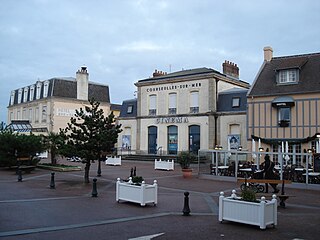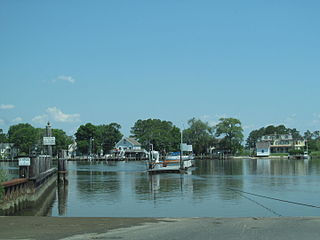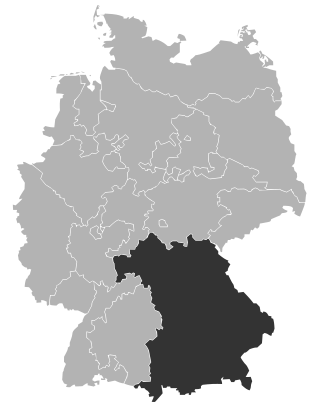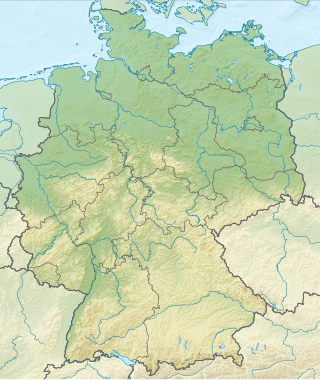
Bavaria, officially the Free State of Bavaria, is a state in the southeast of Germany. With an area of 70,550.19 km2 (27,239.58 sq mi), it is the largest German state by land area, comprising roughly a fifth of the total land area of Germany, and with over 13.08 million inhabitants, it is the second most populous German state, behind only North Rhine-Westphalia; however, due to its large land area, its population density is below the German average. Major cities include Munich, Nuremberg, and Augsburg.

Franconia is a region of Germany, characterised by its culture and East Franconian dialect. Franconia is made up of the three Regierungsbezirke of Lower, Middle and Upper Franconia in Bavaria, the adjacent, Franconian-speaking South Thuringia, south of the Thuringian Forest—which constitutes the language boundary between Franconian and Thuringian—and the eastern parts of Heilbronn-Franconia in Baden-Württemberg.

The Juruá River is a southern affluent river of the Amazon River west of the Purus River, sharing with this the bottom of the immense inland Amazon depression, and having all the characteristics of the Purus as regards curvature, sluggishness and general features of the low, half-flooded forest country it traverses.

Lower Bavaria is one of the seven administrative regions of Bavaria, Germany, located in the east of the state. It consists of nine districts and 258 municipalities.

Ingolstadt is an independent city on the Danube, in Upper Bavaria, with 142,308 inhabitants. Around half a million people live in the metropolitan area. Ingolstadt is the second largest city in Upper Bavaria after Munich and the fifth largest city in Bavaria after Munich, Nuremberg, Augsburg and Regensburg. The city passed the mark of 100,000 inhabitants in 1989 and has since been one of the major cities in Germany. After Regensburg, Ingolstadt is the second largest German city on the Danube.

Jihlava is a city in the Czech Republic. It has about 54,000 inhabitants. Jihlava is the capital of the Vysočina Region, situated on the Jihlava River on the historical border between Moravia and Bohemia.

Courseulles-sur-Mer, commonly known as Courseulles, is a commune in the Calvados department, Normandy, northwestern France. Until 1957, the town's name was simply Courseulles. It lies 3 km west of Bernières-sur-Mer and 18 km north of Caen.

The Wicomico River is a 24.4-mile-long (39.3 km) tributary of the Chesapeake Bay on the eastern shore of Maryland. It drains an area of low marshlands and farming country in the middle Delmarva Peninsula.

Herzogenaurach is a town in the district of Erlangen-Höchstadt, in Bavaria, Germany. It is home to two major international sporting goods companies, Adidas and Puma, and Schaeffler Group, a car parts manufacturer.

Gersthofen is a town in the district of Augsburg, in Bavaria, Germany. It is situated on the west bank of the river Lech, approx. 7 km (4.35 mi) north of Augsburg.
Bavaria Film is a German film production and distribution company that is located in Grünwald, Bavaria at the district of Munich. It is one of Europe's largest film production companies and one of the leading production and distribution companies in the German film and television industry service, with some 30 subsidiaries.

The Evangelical Lutheran Church in Bavaria is a Lutheran member church of the Protestant Church in Germany in the German state of Bavaria.

Markt Indersdorf is a municipality in the district of Dachau in Bavaria in Germany.
Folonzo is a town in the Niangoloko Department of Comoé Province in south-western Burkina Faso. The town has a population of 1,618.

Germany is a country in Central and Western Europe that stretches from the Alps, across the North European Plain to the North Sea and the Baltic Sea. It is the second-most populous country in Europe after Russia, and is seventh-largest country by area in the continent. The area of Germany ranked 63rd and covers 357,600 km2 (138,070 sq mi), consisting of 349,250 km2 (134,846 sq mi) of land and 8,350 km2 (3,224 sq mi) of waters, smaller than Japan but larger than Republic of the Congo.

The Haldi is a tributary of Hooghly River flowing through Purba Medinipur district of the Indian state of West Bengal. The Keleghai joins the Kansai at Tangrakhali under Nandakumar Police Station in Tamluk subdivision. The combined stream is called Haldi River. At 24 kilometres (15 mi) long, the Haldi is the last major river to flow into the Hooghly before the latter flows into the sea. The Haldi joins the Hooghly at the industrial town of Haldia.

The Kahl is a river in the northern Spessart in Bavaria and Hesse, Germany. It is a right tributary of the Main and is 35.6 km (22.1 mi) long. The name Kahl comes from the Old High German word kaldaha, which means cool and clear. The Kahl rises from two sources left and right of the road at the foot of the Spessart hills, near Kleinkahl. These springs produce 50–60 litres per second. The Kahl flows into the river Main in Kahl am Main. The mouth is near the old Kahl Nuclear Power Plant. The largest tributaries are Westerbach, Sommerkahl, Reichenbach and Geiselbach.

In late May and early June 2016 flooding began after several days of heavy rain in Europe, mostly Germany and France, but also Austria, Belgium, Romania, Moldova, Netherlands and the United Kingdom. Among others, the German states of Bavaria, Hesse, Rhineland-Palatinate, Baden-Württemberg, and North Rhine-Westphalia were affected. Beginning at the river Neckar, the Danube, Rhine, Seine and their tributaries were highly affected by high water and flooding along their banks. At least 21 people died in the floods.
















